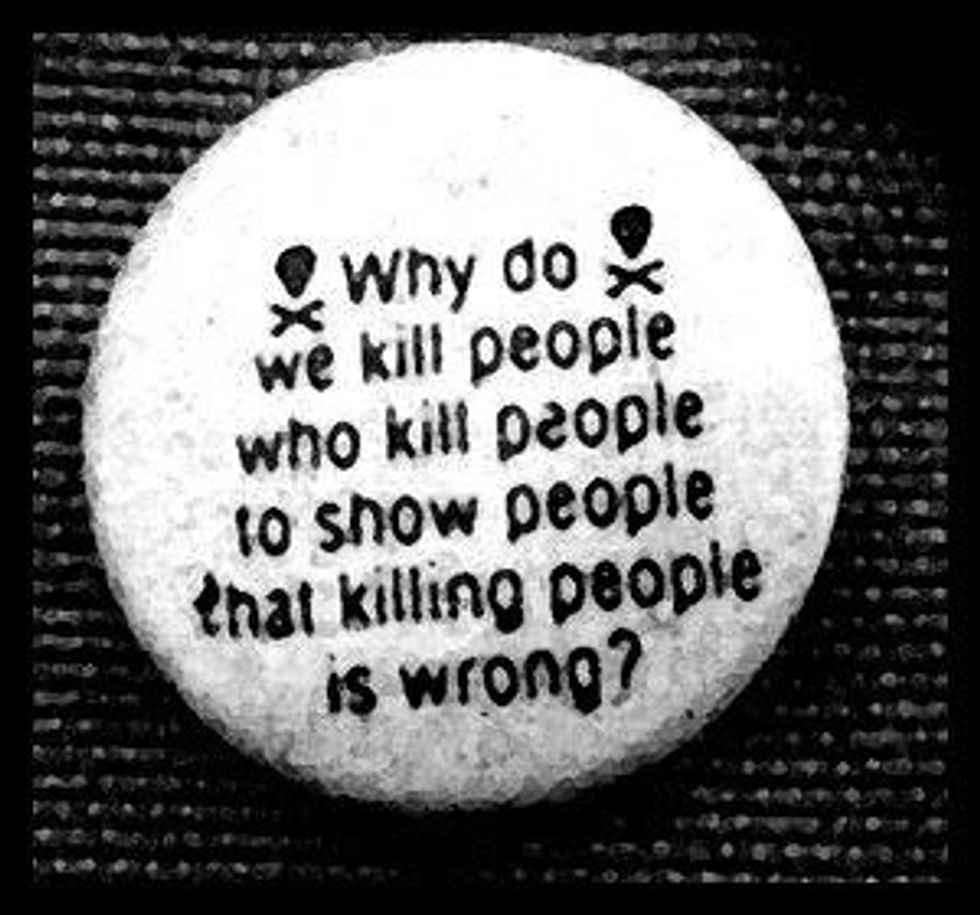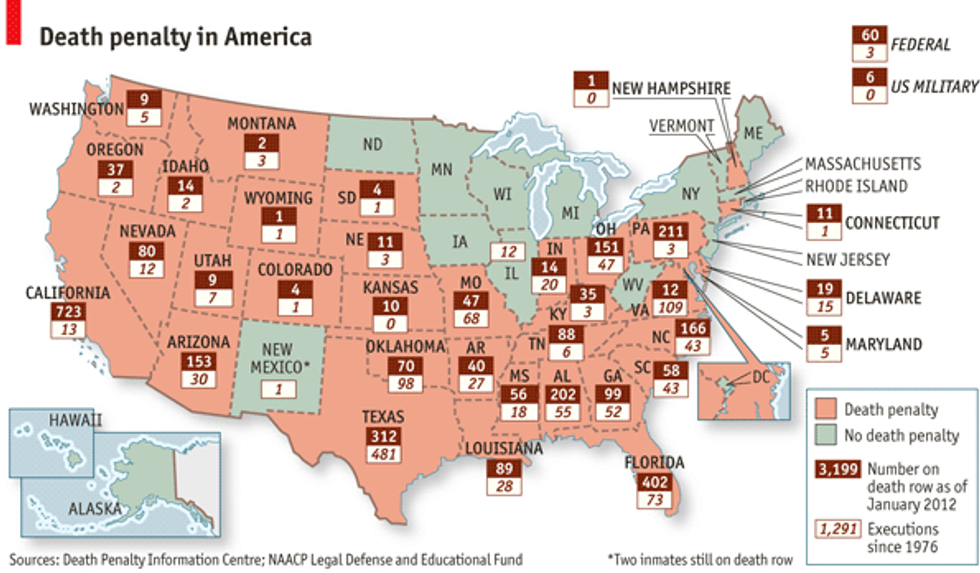The Death Penalty, also known as Capital Punishment, is the use of execution by means of beheading, hanging, shooting, electric chair, gas chamber and most popularly, lethal injection to kill a capital criminal in order to seek retribution and deterrence in the name of justice. The death penalty is a violation of basic human rights set forth in the Eighth Amendment’s ban on cruel and unusual punishment and the Fourteenth Amendment’s guarantee of equal legal protection and therefore is unconstitutional. In addition to the death penalty’s brutally immoral nature, too many innocent people have been erroneously executed due to wrongful capital convictions. Respectively, support for the death penalty has dramatically dwindled among prosecutors, judges, jurors and the general public. After careful consideration of the death penalty’s unconstitutionality, ineffectiveness and decline in its usage and support, the death penalty should and most likely will be abolished in the United States of America.
Dating as far back as 17th century, the Death Penalty has been used worldwide as a means to arbitrarily establish legal authority in response to heinous crimes. However, the death penalty has been abolished in most countries including all of Western Europe. In the U.S., the only crime punishable by death is aggravated murder. Executions in America are rare, with only three federal death penalty sentences carried out in the past half-century. In the 32 states that employ the death penalty, which is most prevalent in Texas, Virginia, Oklahoma and Florida, capital punishment is still an actively debated legal controversy. Of the extensive judicial history of the death penalty, the case of Furman v. Georgia (1972) ruled that capital punishment was unconstitutional, but only prohibited how it was executed. In Gregg v. Georgia (1976), the Supreme Court mandated capital punishment for certain types of murder by approving guided discretion statutes that provides a bifurcated or two-phase proceeding to a defendant accused of capital murder (Costanzo & Krauss, 2015). The following news article comprehensively addresses the major concerns surrounding the modern death penalty.
According to TIME’s “The Death of the Death Penalty,” Drehle lists five main reasons why the era of capital punishment is ending, which includes its inefficiency, a plummeting crime rate, lack of legitimate justifications, costliness and unconstitutionality. The death penalty is inefficient mainly due to its ineffective methods, the lengthy process of appeals, failure to deter crime and the troubling amount of erroneous executions. There is no evidence to show that capital punishment suppresses the murder rate. In actuality, we are safer now than we were a generation ago, with 1,900 murders less per year now compared to the 1990s. State and federal courts are so delayed with capital cases that most death row inmates never even make it to execution. This tediously lengthy process is on account of the overflux of capital court cases combined with the government budget cuts and lack of qualified defense attorneys. To make matters worse, the American death penalty system is so hazardously slow that it is at least six times more expensive than the life-without-parole alternative. If they do make it to execution, it can take nearly two hours for lethal injection to execute, that is if the inmate is not executed by some of the more barbaric methods.
Most distressing would be the growing list of innocent death-row inmates who were freed after DNA evidence exonerated at more than one hundred fifty since 1975. It is speculated that at least 23 capital cases involved the execution of an innocent person. In particular, systemic racial disparities indicate that black defendants are more likely to be arrested, charged, convicted, and executed in death penalty cases. In federal appeals court, the issue of whether long delays and infrequent executions render the death penalty unconstitutional. Furthermore, Drehle notes that killing killers won’t bring back the victims. Most importantly, technologically advanced supermax prison facilities make life-without-parole condemned to solitary confinement a fate worse than death.
An empirical study by Harmon (2004) analyzed the significance of racial bias as an influential factor in mistaken capital conviction. Prior research suggests that the primary reasons for capital case errors are due to racial discrimination. It is estimated that more than 350 individuals have been wrongfully convicted and that 23 were wrongfully executed. For most death penalty cases, the combination of minority defendants and white victims are most likely to result in a death sentence.
In conclusion, this study found that racial factors were the main cause of error in capital cases. With regard to the small sample size of the comparison groups, the results reveal that of exonerated death row inmates, the majority consisted of minority defendants convicted of killing white victims.
An empirical study by LaChappelle (2014) measured whether knowledge about the death penalty, including key arguments for abolition such as racial discrimination, lack of deterrent effect, and innocence, would reduce America's support for it. This is one of the first few studies that examines the impact that the contextual information of the international argument against the death penalty has on public opinion.
The results tested the hypothesis of to what degree did exposure to international information about the death penalty have on the students used, if they were affected. Using a Likert-type scale that utilized three sections of measurement: neutrality, opposition and support, the pre-test support shows that the majority of students were neutral and/or unsure. In the post-test support,with regard to the multiple methods that could have been used, the findings show that the majority of students became opposed to the death penalty after presenting information on contextual information of the death penalty.
In conclusion, after subsequent analysis from TIME’s article "The Death of The Death Penalty," and studies from Harmon (2004) and LaChapelle (2014), it is clear that the death penalty is heavily flawed in disproportionate ways which may inevitably lead to its abolition.
From TIME’s article, we can conclude that the many errors involved with capital punishment are startlingly eminent, such as a lack of government funding, lack of availability of proficient defense attorneys, the lengthy appeals and reviews process, lack of efficiency in the lethality of the methods used, the role that racial bias has as a predominant factor in wrongful executions, the declining crime rate and the general rise in opposition to the death penalty. Drehle also notes that killing killers won’t bring back the victims.
From Harmon (2004), we can summate that racial bias in capital cases is strong, with the majority of death row exonerees being minority defendants wrongfully convicted of murdering a white victim. From LaChapelle (2014), we can infer that the contextual international information about the death penalty presented to the university students is what largely shifted the general consensus towards death penalty opposition.
Lastly, the heated domestic and international debate on capital punishment still remains at the forefront of judicial issues. It is highly unlikely that we will find a system that works without any error or bias. The main question of whether or not we should continue to use the death penalty is ultimately a moral one, with consideration to data from social science. Hence, the main justification used against the death penalty is that it is unconstitutional in part that it violates our rights protected in the eighth and fourteenth amendment. Modern day capital punishment and its wearisome process is still cruel, unusual, and often unfair. Despite the death penalty’s use on only capital criminals, killing even a killer is immoral as it contradicts the illegality of murder and capital crimes.






















